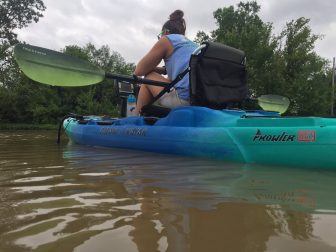
Kandace Griffin tracks sea lamprey with sonar.
Editor’s note: This is part of a series of stories about how COVID-19 derailed the research of many aspiring Great Lakes scientists. It is edited for length and clarity.
By Claire Moore
Kandace Griffin, a doctoral student at Michigan State University, planned to track invasive sea lamprey with sound equipment this summer.
“The challenges that the COVID-19 pandemic has caused is the uncertainty we have of when we’re going to be able to get in the field. The sea lamprey migration is very seasonal. We have from May to the middle of June to work in the field, because that’s when they’re migrating.
“We work with several institutions that not only meet at MSU. We also work with the U.S. Fish and Wildlife Service. They’re the ones that operate traps for animals that we would use for research. We also work with the U.S. Geological Survey. Those are the folks I’m working with for my field research, because they’re experts in telemetry equipment.”
“My research is on the movement ecology of the invasive sea lamprey. We’re looking to supplement control efforts in the Great Lakes. Currently we rely on a pesticide application to control the larvae, and that application is not always feasible. … We’re trying to devise some alternative control techniques to use in areas where the pesticide is not a feasible option. We also use some of our research to help with management. In other parts of the world, sea lamprey are actually imperiled, and so we’re trying to find out how sea lamprey make their movement decisions and spawning.
“MSU says we can’t get out in the field or Fish and Wildlife Services says that their employees are continuing to telework. We have expertise in a lot of different areas, but we’re vulnerable to halting the projects in a lot of places, too.
“A big capital issue is that the acoustic telemetry equipment I would be using is very expensive. What we do is we put these receivers in the water, and then I put a tag in the animal. The receivers we have are on loan, so we are able to use those just fine. But the tags are only good for a couple months after the company builds them. That’s tens of thousands of dollars I was planning to use this year. We can’t make the mistake of buying them this year and then not being able to get them in the water. The batteries would deplete.”
“At the beginning, there were gaps in communication, particularly with the graduate students. At first, we didn’t know if we were students or faculty, particularly when they said ‘Go back to your permanent residence.’ We were like, ‘Wait a minute, are we still required to come on campus? Are we now employees? Where do we fall?’ When updates were coming down, sometimes we were being missed. We did bring that up to our leadership. Now I sometimes get the same email two or three times, but I’d rather get it two times than no times.
“We’ve been thinking about alternatives that we can do. For me and my degree path, it might not be a huge issue. The lab that I’m in now with Dr. Wagner – we have a dataset from a previous student and postdoc that needs to be analyzed and would contribute substantially to my project. It’s using the same type of equipment that I would be using in the field.
“They’ve already collected the data. It would help me to go through and analyze it. There’s a chance of publication, and it could add a significant chapter to my dissertation. So I do have an alternative if this field season is lost.
“For my degree program, losing this field season might not be the worst, but it is still disappointing that I might not be able to get into the field this summer like I was planning.”